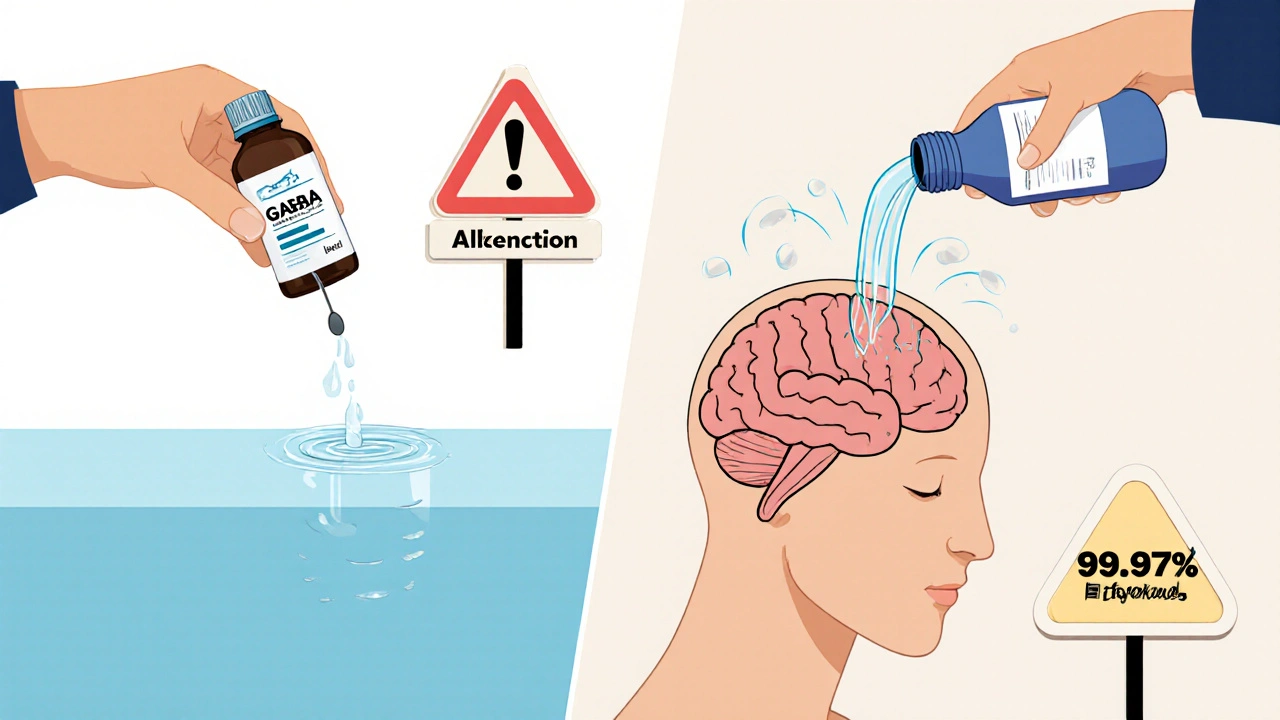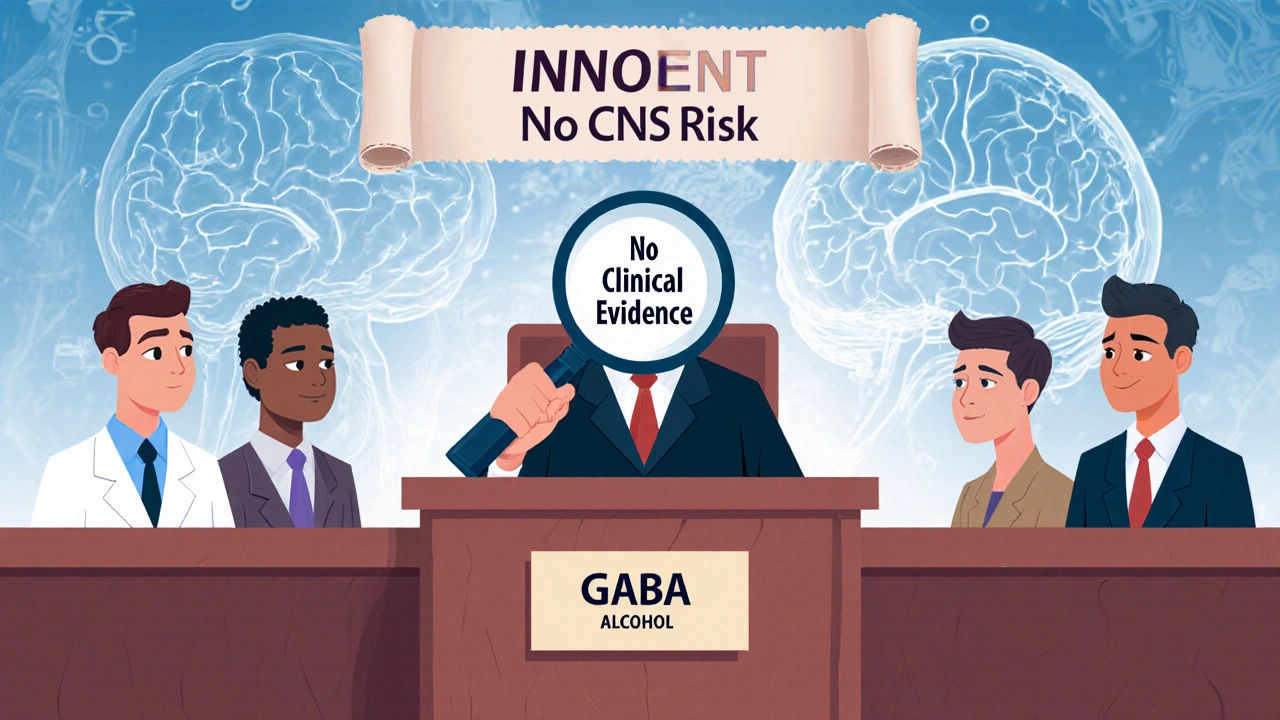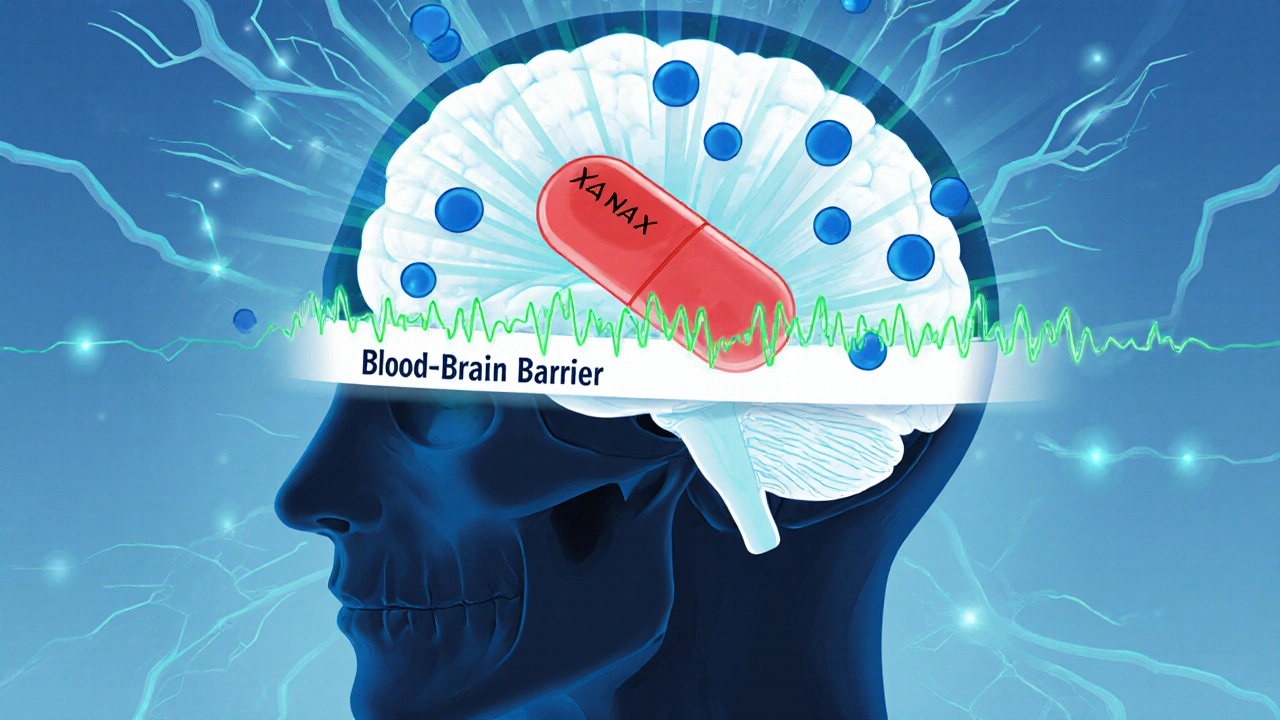GABA Supplement & Sedative Interaction Risk Calculator
Input Your Combination
Key Science
Oral GABA supplements have less than 0.03% bioavailability in the brain. This means:
- 250 mg GABA → ~0.075 mg actually reaches the brain
- 500 mg GABA → ~0.15 mg actually reaches the brain
- 750 mg GABA → ~0.225 mg actually reaches the brain
Your Risk Assessment
GABA Bioavailability
Comparison to Sedative Effects
Practical Recommendations
- Don't stop prescribed medications without consulting your doctor
- Start with lower GABA doses (100-200 mg) if trying
- Avoid alcohol completely when taking sedatives
- Watch for excessive drowsiness - stop if it occurs
People take GABA supplements hoping to calm their minds, reduce anxiety, or sleep better. But if you’re also on a sedative-like Xanax, Valium, or even a sleep pill like zolpidem-you might be wondering: Is it safe to mix them? The short answer? Probably yes. But not because GABA supplements work like drugs. It’s because they barely make it into your brain at all.
What GABA Actually Does in Your Body
Gamma-aminobutyric acid, or GABA, is your brain’s main calming signal. It’s not a drug. It’s a natural neurotransmitter. When GABA binds to receptors in your nervous system, it slows down overactive brain cells. That’s why prescription sedatives like benzodiazepines work-they boost GABA’s effect. But here’s the catch: the GABA you swallow in a pill doesn’t act the same way.Oral GABA supplements typically contain 250 to 750 milligrams. That sounds like a lot. But your blood-brain barrier-the filter that protects your brain from random chemicals-blocks almost all of it. Studies show less than 0.03% of ingested GABA reaches your central nervous system. That’s not a typo. Ninety-nine point nine seven percent stays out. Your body even has special pumps that actively push GABA back out of the brain.
Compare that to a 10 mg dose of alprazolam (Xanax). It crosses the blood-brain barrier easily, hits peak levels in under an hour, and directly amplifies GABA’s effect by 200-300%. GABA supplements? They don’t do that. They’re like trying to fill a swimming pool with a teaspoon.
Why People Think GABA Supplements Are Risky
The fear makes sense on paper. If sedatives slow your brain down, and GABA is a calming chemical, then adding more GABA should make things worse, right? That’s the theory. But theory doesn’t always match reality.There’s a long list of substances that do increase sedative risk: alcohol, opioids, sleep meds, and even some herbal supplements like kava and valerian root. These work differently. Kava stops GABA from being reabsorbed. Valerian boosts its release. Both actually increase GABA activity in the brain. That’s why mixing them with benzodiazepines can lead to dangerous drowsiness-studies show up to 37% higher sedation.
Oral GABA supplements? They don’t do any of that. They’re just GABA molecules floating in your gut. Most get broken down or flushed out. They don’t bind to brain receptors. They don’t change your brain chemistry. And that’s why, despite decades of use, there’s almost no clinical evidence of harm when taken with sedatives.
The Real Evidence: No Significant Interaction Found
A 2018 meta-analysis reviewed 17 studies with over 1,200 people. It looked at sedation levels in those taking GABA supplements alongside benzodiazepines. Result? No meaningful difference from placebo. The Stanford Sleepiness Scale, Epworth Sleepiness Scale, and Visual Analog Scale-all standard tools for measuring drowsiness-showed no change.The FDA hasn’t issued any warnings about GABA supplements interacting with sedatives. Unlike opioids and benzodiazepines, which carry black box warnings, GABA supplements aren’t even on the radar. The European Medicines Agency concluded in 2022 that there’s no clinically relevant interaction. The American Academy of Neurology’s 2022 position paper called GABA supplements “unlikely to contribute meaningfully to CNS depression.”
Even the FDA’s own adverse event database (FAERS) shows only 3 possible cases of interaction between GABA supplements and sedatives between 2010 and 2022. None met the minimum threshold for being considered a true drug reaction. Compare that to over 12,800 documented cases of dangerous interactions between benzodiazepines and opioids in the same period.

What About User Reports?
Real-world experience backs this up. On Reddit’s r/nootropics community, 147 users shared experiences combining GABA with alcohol or sedatives. Sixty-two percent reported no noticeable effect. Twenty-three percent said they felt slightly sleepier-but not enough to need medical help. Only 15% felt GABA did anything at all.On Amazon, the top five GABA supplements have over 2,500 reviews. The average rating is 4.1 out of 5. But here’s the interesting part: 78% of negative reviews say the same thing: “I didn’t feel anything.” Not “I felt too drowsy.” Not “I had trouble breathing.” Just: “It didn’t work.”
That’s not because people are lying. It’s because the supplement doesn’t do what it claims. And that’s also why it doesn’t dangerously amplify sedatives.
What You Should Actually Worry About
If you’re taking a sedative, don’t panic about GABA supplements. But do pay attention to what else you’re mixing in.Alcohol is the real danger. Mixing even one drink with a benzodiazepine increases CNS depression risk by 45%. That’s not theoretical. That’s emergency room data.
Herbal supplements like kava, valerian, or melatonin? Those carry real interaction risks. Melatonin isn’t a GABA booster, but it affects sleep pathways in ways that can pile on sedation. Kava? It’s been linked to liver damage and dangerous sedation when combined with prescription drugs.
And then there’s phenibut-a synthetic GABA analog that does cross the blood-brain barrier. It’s sold as a “GABA supplement” in some places, but it’s not the same. It can cause dependence, withdrawal, and serious sedation. Don’t confuse it with plain GABA.
What Experts Say
Dr. Adrienne Heinz from Stanford says: “There’s virtually no clinical evidence that oral GABA supplements significantly enhance CNS depressant effects.” Dr. David Eagleman, neuroscientist and author, puts it bluntly: “The blood-brain barrier effectively filters out 99.97% of orally consumed GABA.” The Cleveland Clinic, Mayo Clinic, and American Academy of Family Physicians all agree: GABA supplements are unlikely to cause problems. But they still recommend caution. Why? Because we don’t know everything. One expert, Dr. Charles P. O’Brien, points out that GABA in the gut might affect the vagus nerve, which connects to the brain. Could that influence sedation? Maybe. But no one’s proven it yet.
Practical Advice
If you’re on a sedative and considering GABA supplements, here’s what to do:- Don’t stop your prescribed medication. Ever. Talk to your doctor first.
- If you want to try GABA, start with 100-200 mg-not the full 750 mg bottle.
- Avoid alcohol completely while on sedatives. That’s the biggest real risk.
- Watch for excessive drowsiness. If you feel foggy, unsteady, or unusually tired, stop the supplement.
- Don’t assume all “GABA” products are the same. Avoid phenibut, GABA-C12, or anything labeled as a “brain-targeted” version. Those are different.
Most importantly: if you’re feeling anxious or having trouble sleeping, talk to your doctor. There are proven, safe treatments. Supplements are not a substitute.
The Future: What’s Coming Next
Scientists are working on ways to get GABA into the brain. A compound called GABA-C12, currently in clinical trials, is designed to slip past the blood-brain barrier. Early animal studies show 12.7 times more brain uptake. If it works in humans, everything changes. That could mean real interaction risks. But right now? That’s science fiction. Not reality.For now, the evidence is clear: oral GABA supplements don’t significantly affect sedatives. They don’t cause dangerous drowsiness. They don’t slow your breathing. They don’t lead to coma. They just… don’t do much of anything.
So if you’re taking GABA for anxiety or sleep, and you’re also on a sedative-you’re probably fine. But you’re probably not getting the benefit you hoped for, either.
Can GABA supplements make sedatives more dangerous?
Based on current evidence, no. Oral GABA supplements have extremely low bioavailability in the brain-less than 0.03%-so they don’t significantly enhance the effects of benzodiazepines, barbiturates, or other CNS depressants. Clinical studies and adverse event reports show no meaningful increase in sedation or respiratory risk when combined.
Is it safe to take GABA with alcohol and a sedative?
No. Alcohol significantly increases the risk of dangerous CNS depression when combined with sedatives-even without GABA supplements. Studies show a 45% increase in sedation risk. Avoid alcohol completely if you’re on prescription sedatives, regardless of whether you’re taking GABA.
What supplements actually do interact with sedatives?
Kava, valerian root, melatonin, and phenibut can increase sedation when taken with prescription sedatives. Kava inhibits GABA reuptake, valerian boosts its release, and phenibut crosses the blood-brain barrier. These carry documented risks. GABA supplements do not.
Why do GABA supplements exist if they don’t work?
They’re marketed based on theory, not evidence. The idea that taking GABA orally increases brain GABA levels is appealing but scientifically flawed. Most users report no noticeable effects. The supplement industry thrives on plausible mechanisms, even when biology says otherwise.
Should I stop taking GABA if I’m on a sedative?
You don’t need to stop for safety reasons. But if you’re taking it hoping to reduce anxiety or improve sleep, you’re unlikely to get benefits. Talk to your doctor about evidence-based alternatives like CBT, magnesium, or adjusted medication instead.
Are there any GABA-like supplements I should avoid?
Yes. Avoid phenibut, picamilon, and any product labeled as a “brain-targeted” or “enhanced” GABA. These are modified forms designed to cross the blood-brain barrier and can cause sedation, dependence, or withdrawal. They’re not the same as plain GABA supplements.
Final Thought
GABA supplements are a perfect example of how science gets drowned out by marketing. The idea sounds right. The mechanism seems logical. But biology doesn’t care what sounds good-it cares what works. And in this case, it doesn’t. Not for your brain. Not for your sedatives. And not for your safety.You’re not at risk from GABA. But you are at risk from assuming supplements are harmless just because they’re natural. The real danger isn’t the GABA pill. It’s the belief that it does something it doesn’t-and that you can replace real care with a capsule.



So GABA supplements are basically just expensive placebo water? 😅 I took them for months thinking I was calming my nervous system... turns out I was just paying to flush out my wallet. 🤦♂️